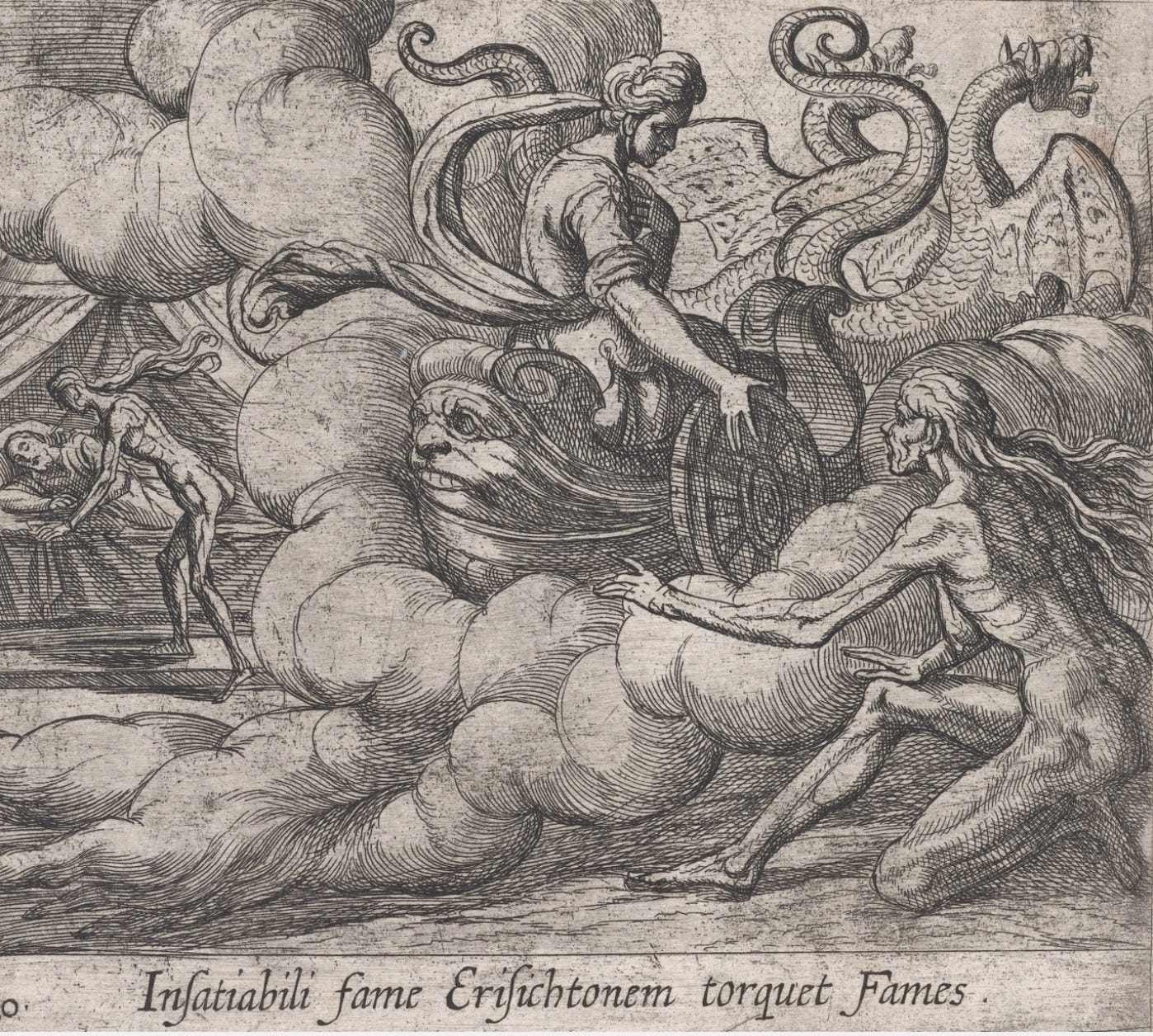A Shot at Abundance
One can sympathise with humankind’s struggle to moderate itself despite facing climate breakdown.
The Greek king Erysichthon lives without respect for the gods. One day, he cuts down the sacred grove of Demeter, goddess of the harvest and agriculture, to construct an impressive banquet hall. Erysichthon kills a dryad nymph in the process, who uses her final words to curse the king. Demeter honours the nymph’s plight by ordering the spirit of hunger—Fames—to place herself in Erysichthon’s stomach, giving him an insatiable appetite. The more he eats, the hungrier he gets. Erysichthon sells all his possessions to buy food, but the hunger remains; he even sells his daughter into slavery. In the end, the once-great ruler starts to eat his own limbs, killing himself.
This story—from Book 8 of Ovid’s Metamorphoses—has become an allegory for humankind’s relationship with nature. And for good reason. Last year was the warmest on record, the first to pass 1.5C above pre-industrial levels. UN Secretary-General António Guterres described the recent temperatures as a “climate breakdown”.

The international 1.5C climate target has not been broken since it refers to a long-term average, but the present trajectory looks discouraging. Global carbon emissions have risen in recent years. Extreme weather events have followed. The United States alone experienced 24 confirmed climate disasters in 2024, and, as these words are written, Los Angeles is on fire. In May, there were heavy floods in the Brazilian state of Rio Grande Do Sul, killing at least 183 people. The natural disaster with the highest death toll was Typhoon Yagi—over 750 people lost their lives when it swept across the Philippines, southern China, Vietnam and Myanmar in September. These are just three of countless examples.
Meanwhile, Gilded Age-style oligarchic capitalism—save its traditional sense of noblesse oblige—is making a triumphant return across the West. It threatens the few climate measures already in place and makes it harder to agree on new ones. The money must flow, even if profit generation kills all the paying customers.
How many more of Demeter’s trees can we cut down before a fatal curse is put on us? Not many, I would guess.
Human greed and lust for power are central to our current predicament. But so, too, are people’s inquisitiveness and constant striving to improve their situation. It is hard, if not impossible, to define what makes one human. Still, I think a key component is our genuine curiosity. Agricultural inventions and industrial revolutions gave rise to harmful practices such as overconsumption, resource hoarding and unequal power relations. However, they were also driven by the need to stave off hunger and scarcity.
Humanity has lived most of history in a condition of scarcity; food and shelter were hard to come by. For many, it still is. From this perspective, one can sympathise with humankind’s struggle to moderate itself—like an animal running rabid when finally unshackled from its constraints. This goes for individuals in advanced economies who are not slowing down their consumption and those in developing countries who want to use any means necessary to catch up. Both are equally understandable.
Humans began to break the biological old regime containing population growth through disease and other hardships around 1500. In the delirium following the discovery of our new powers, we have perhaps overdone it. I think that’s a shame, but I don’t blame us. Such is the complex nature of human beings—ordained by Providence or Fortune to inhabit a planet in the Goldilocks zone, where the air is breathable and water remains liquid.
The fight against climate change is not yet over. There is time to steady the ship. But if we fail and, like Erysichthon, devour ourselves, do not judge us too harshly.
// Adrian




Hi. A big task controlling one's greed. A rich man always wants more....it is indeed a vicious circle and will ultimately signal the end of mankind..
The end is near!!